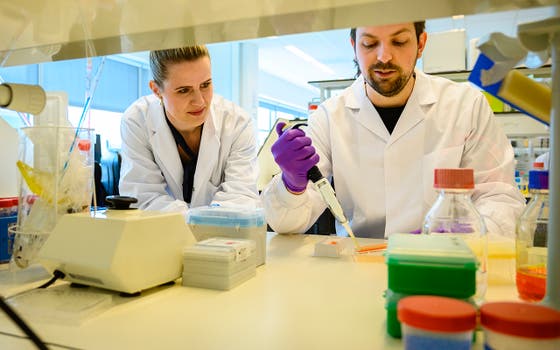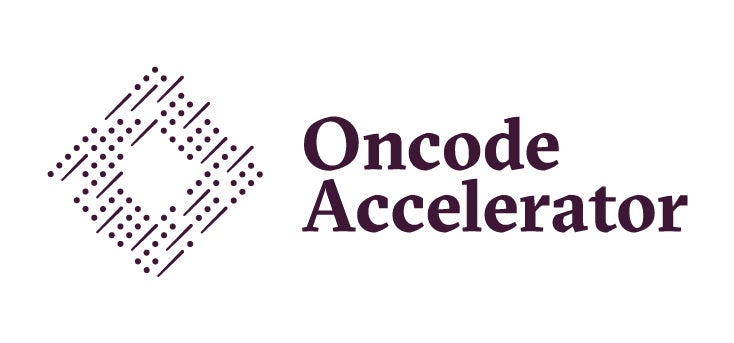New partnership accelerates the development of new cancer therapies

Cancer is one of the greatest health challenges of our time. We still do not succeed in providing effective treatment to all cancer patients. Oncode Accelerator now aims to change this. Within this partnership, more than 30 public and private partners, including UMC Utrecht, are now working together. Its aim: to make patients benefit from effective therapies faster.
Discovering, developing and marketing a new medicine takes a long time, involves lots of risks and is expensive. In addition, a new treatment often only is effective with a part of the patients.
Oncode Accelerator aims to tackle this problem by connecting scientific cancer research to clinical practice more quickly. In other words, by involving patients earlier in the development of new cancer therapies, the process will be speeded up (accelerated).
To achieve that goal, more than 30 public and private partners are now joining forces. Within Oncode Accelerator, UMC Utrecht is one of the six coordinating partners. UMC Utrecht's cancer researchers will specifically focus on patient cohorts, biologics and cell & gene therapy.
What does Oncode Accelerator do?
Friso Smit, co-executive director of Oncode Accelerator, says: "In this early, pre-clinical stage of development, we want to put the patient first. We work with three innovation platforms: well-defined patient populations, organoids (cultured mini-tumours – ed.) and predictive models based on artificial intelligence."
Furthermore, by connecting public and private parties, Oncode Accelerator brings together Dutch expertise in four types of cancer therapies: small molecules, therapeutic antibodies, cell and gene therapies and therapeutic vaccines.
"By weaving the three innovation platforms into this existing infrastructure of cancer therapies, we think we will be able to predict much earlier and more accurately which patient will benefit from a new treatment," says Miriam Koopman, internist-oncologist and professor of medical oncology at UMC Utrecht.
Patient populations under the microscope
Miriam is in charge of the platform that focuses on properly defining patient populations, also known as ‘cohorts’. Tissue and other data from treated patients are collected and analysed within such a cohort (with the patients' consent).
"At UMC Utrecht, we have a lot of research experience with data and material from patient cohorts to answer preclinical, translational and clinical questions. Our goal here is to learn from each patient to improve outcomes for the next patient. By already using the data and tissues from patients within Oncode Accelerator in the preclinical development of new medicines, we expect that a drug will be much more likely to be effective. In addition, the cohort structure will contribute to conducting early clinical trials smarter and more effectively. We would like to achieve this by establishing a national platform. Within this platform, adaptive studies (flexible research that allows for changes during its execution – ed.) will be done in cooperation with the experts of the Julius Centre of UMC Utrecht," Miriam clarifies.
By connecting the preclinical development process with clinical practice, Oncode Accelerator increases the chances of candidate drugs proving their worth in large-scale clinical studies.
Antibodies at work
Besides the cohort platform, UMC Utrecht also coordinates the working consortium focusing on therapeutic antibodies, or ‘biologics’: therapies that use or additionally activate your body's immune system to clear cancer or reduce side effects of treatments.
Jeanette Leusen, associate professor and head of the immunotherapy group and UMAB facility at UMC Utrecht, says: "Therapeutic antibodies have taken off in recent years. This is mainly due to the application of so-called 'checkpoint inhibitors', which reactivate immune cells to recognise and clear cancer cells. We have extensive expertise in making new antibodies at the UMAB facility, especially in recognising and eliminating tumours directly. With the implementation of Oncode Accelerator's unique platforms, we will be able to this even faster and more effectively."
At cell and gene level
Finally, within Oncode Accelerator, UMC Utrecht plays a prominent role in cell and gene therapy research: studying and manipulating genes and cells in order to develop new medicines.
Jürgen Kuball, internist and professor of haematology at UMC Utrecht, says: "UMC Utrecht has a lot of knowledge on the development of early-clinical studies with new living drugs, which consider cancer as a metabolic disease. As a result, we have a lot of living drugs already in the pipeline. But we can also test more quickly in unique 3D models which therapies will give the highest chance of success in clinical trials. For living drugs, Oncode Accelerator offers a unique opportunity to speed up the development cycle from ideas to patients, thus improving the accessibility of new therapies."
Development candidate medicines
How does Oncode Accelerator, in practice, speed up the application of new medicines? "Through so-called demonstration projects, candidate drugs will be developed based on our innovative way of working," explains co-executive director Friso. "The aim this procedure is twofold: to demonstrate that we are actually able to develop treatments more efficiently, and to deliver tangible results for patients at the same time."

About Oncode Accelerator
Oncode Accelerator is a joint effort of more than 30 public and private partners. The programme is coordinated by six partners: Leiden University, Leiden University Medical Centre, Netherlands Cancer Institute, Princess Máxima Centre for paediatric oncology, University Medical Centre Utrecht and Oncode Accelerator Foundation. It is co-funded by the National Growth Fund and cooperates with the Dutch Ministries of Health and Economic Affairs.
Would you like to know more? Watch this video for further explanation of the Oncode Accelerator partnership.
